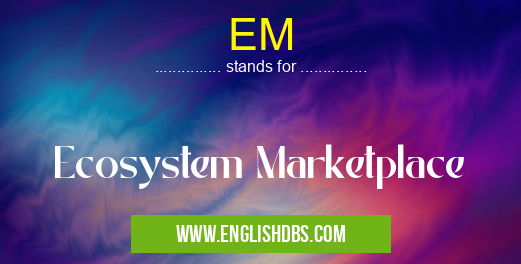What does EM mean in ENVIRONMENTAL
Ecosystem Marketplace (EM) is a term used in the context of GOVERNMENTAL to facilitate trades of ecosystem services, such as carbon sequestration, water purification, and biodiversity conservation.

EM meaning in Environmental in Governmental
EM mostly used in an acronym Environmental in Category Governmental that means Ecosystem Marketplace
Shorthand: EM,
Full Form: Ecosystem Marketplace
For more information of "Ecosystem Marketplace", see the section below.
EM Meaning in GOVERNMENTAL
EM stands for Ecosystem Marketplace and refers to a platform that connects buyers and sellers of ecosystem services. These services include:
- Regulating services (e.g., climate regulation, flood mitigation)
- Provisioning services (e.g., food, water, timber)
- Cultural services (e.g., recreation, spiritual enrichment)
- Supporting services (e.g., soil formation, nutrient cycling)
EM Full Form
Ecosystem Marketplace
What does EM Stand for
EM stands for Ecosystem Marketplace, a platform where:
- Buyers seek to offset their environmental impact or invest in sustainable practices.
- Sellers offer ecosystem services generated from their land or management practices.
Essential Questions and Answers on Ecosystem Marketplace in "GOVERNMENTAL»ENVIRONMENTAL"
What is Ecosystem Marketplace (EM)?
Ecosystem Marketplace (EM) is an online platform that connects buyers and sellers of ecosystem services. Ecosystem services are the benefits that people get from nature, such as clean water, clean air, and flood control. EM provides a marketplace for these services, allowing buyers to find and purchase them from sellers.
What are the benefits of using EM?
There are many benefits to using EM, including:
- Increased access to ecosystem services: EM provides buyers with access to a wide range of ecosystem services, including water quality trading, carbon offsets, and biodiversity conservation.
- Reduced costs: EM can help buyers to reduce the costs of ecosystem services by connecting them with multiple sellers and providing a transparent pricing mechanism.
- Improved environmental outcomes: EM can help to improve environmental outcomes by encouraging the development and adoption of sustainable practices.
Who can use EM?
EM can be used by a variety of stakeholders, including:
- Buyers: Buyers can use EM to find and purchase ecosystem services that meet their needs.
- Sellers: Sellers can use EM to market and sell their ecosystem services to buyers.
- Governments: Governments can use EM to develop and implement policies that support the development and use of ecosystem services.
How does EM work?
EM works by connecting buyers and sellers of ecosystem services. Buyers can post requests for proposals (RFPs) on EM, and sellers can respond with bids. Buyers can then select the best bid and purchase the ecosystem services that they need.
Is EM free to use?
Yes, EM is free to use for both buyers and sellers.
Final Words: EM plays a crucial role in government efforts to promote sustainable land management, biodiversity conservation, and climate change mitigation. By facilitating trades of ecosystem services, EM enables the recognition and valuation of the often overlooked benefits provided by nature.
EM also stands for: |
|
| All stands for EM |
